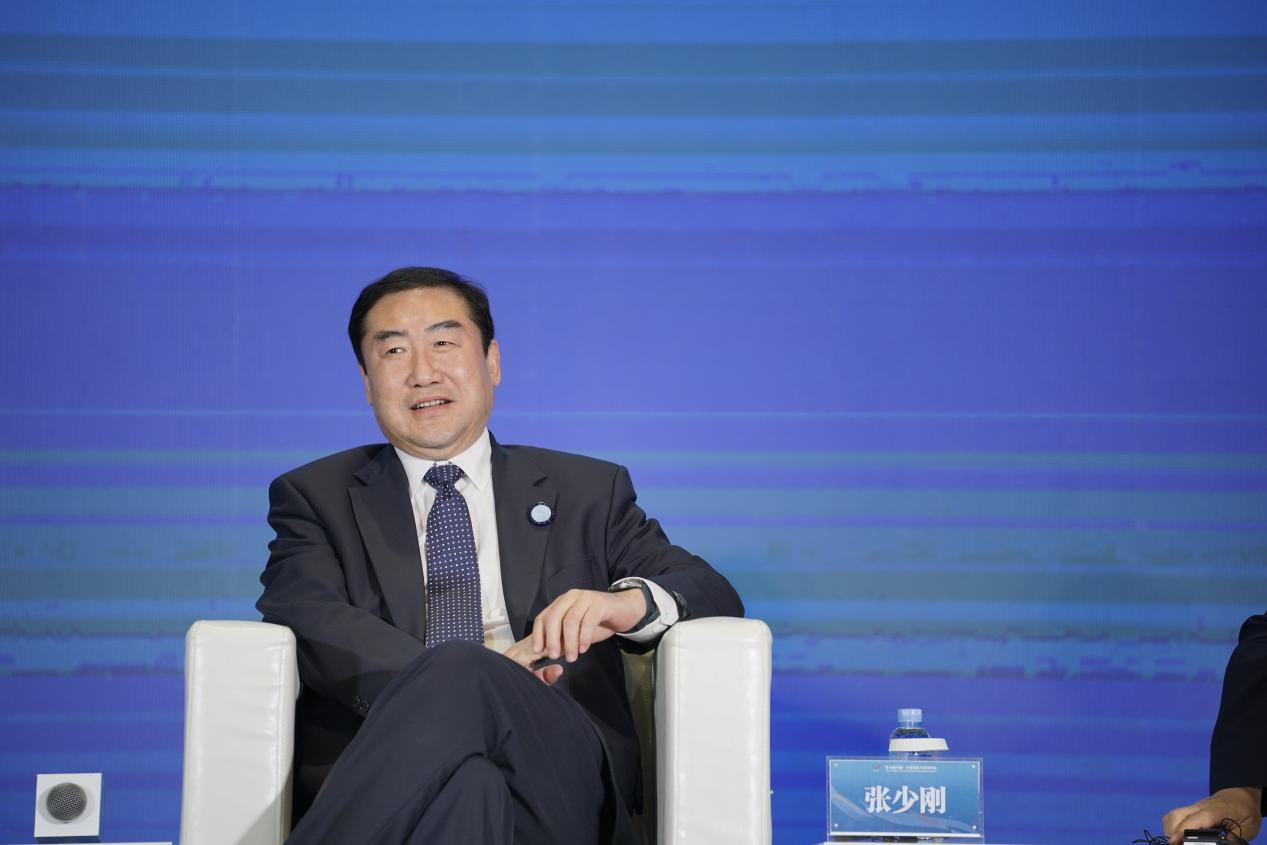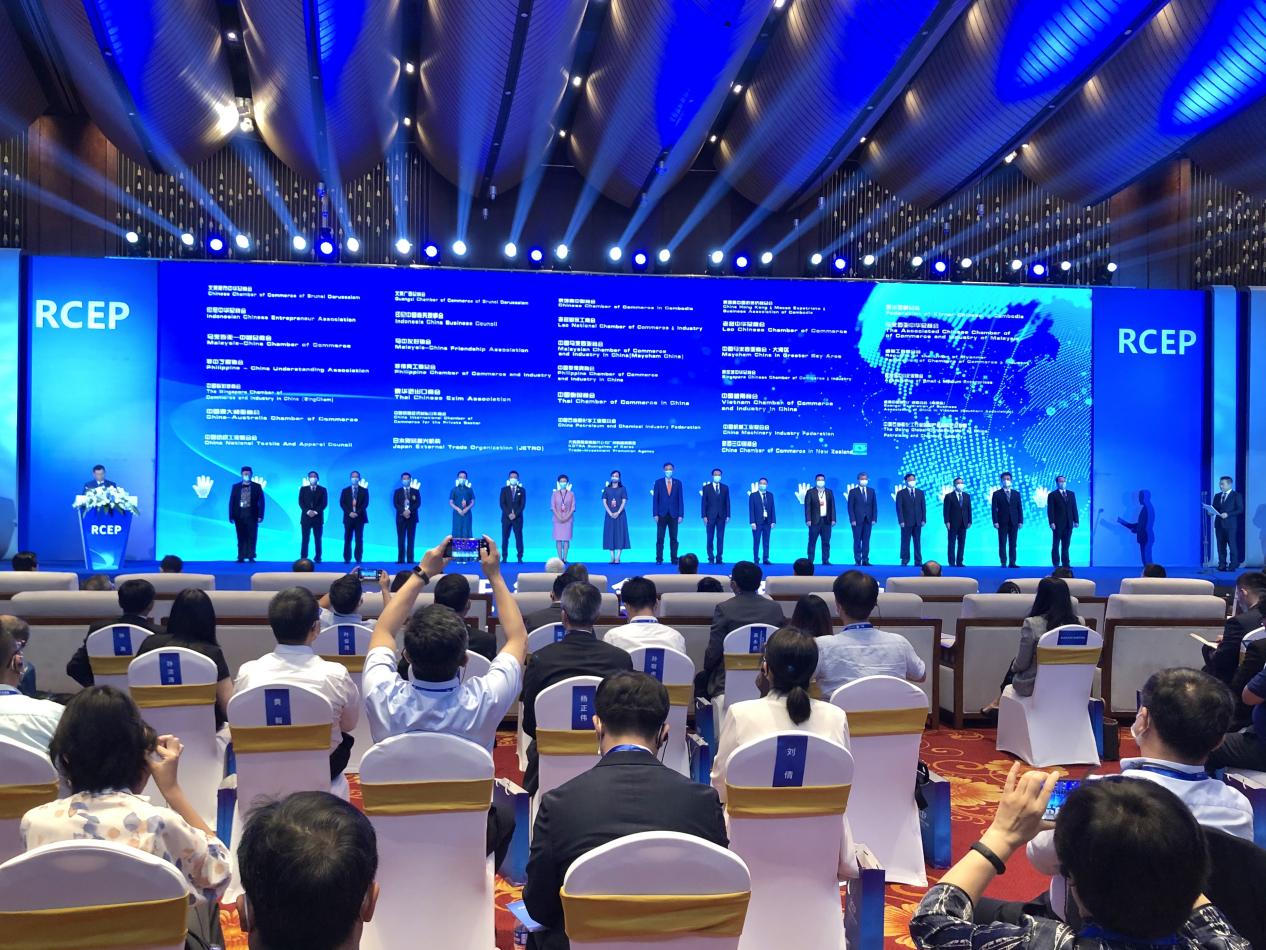

Written by Xu Junhao / Translated by Huang Rong and Chen Zhiying
Tariff reduction and exemption, trade and investment facilitation, unification of rules, the largest market worldwide... The Regional Comprehensive Economic Partnership (RCEP), a high-profile multilateral free trade agreement, has become an “accelerator” to boost the economy in the Asia-Pacific region, although not yet come into force. The business communities of member countries have great expectations for it.
Almost all industries will benefit
“As a person who was involved in the first half of the game (negotiations) and the second half of the promotion phase, I am full of confidence in the prospects of RCEP”, Zhang Shaogang, Vice Chairman of China Council for the Promotion of International Trade (CCPIT), said at the China-ASEAN Business Leaders Forum and Special Meeting on the 30th Anniversary of China-ASEAN Dialogue Relations. As the Former Director General of the International Affairs Department of the Ministry of Commerce, Zhang Shaogang participated in most of the RCEP negotiations, and now he has played a role in promoting the implementation of the RCEP. In his view, the elimination of tariffs, reduction of market barriers and more vigorous trade and investment are the most significant features and effects of RCEP as a free trade agreement.

Most of the RCEP members are important trading countries, and they have high expectations for the trade and investment promotion effect of RCEP, especially the export of agricultural products, aquatic products and rubber products from New Zealand and ASEAN countries, as well as electronic products from Japan and South Korea. “RCEP provides us with a platform to expand and deepen our trading partnership,” Daniel Mathieson, CEO of New Zealand’s Zespri International Limited, which has the largest share of the global kiwifruit market, said at the 2021 RCEP Economic and Trade Cooperation Business Summit Forum.

Relatively speaking, Japan and South Korea may look forward to RCEP to help establish a free trade partnership between China and Japan, as well as between Japan and South Korea for the first time. Hong Changpyo, President of Korea Trade-Investment Promotion Agency in China Head Office, said: “RCEP has formed a free trade relationship involving China, South Korea and Japan for the first time, which will further strengthen two-way investment and trade relations between China and South Korea... High-end manufacturing industries such as smart devices, machinery and automobiles in China, South Korea and Japan are highly developed, and there is strong (industrial) correlation and complementarity among the three countries, which lays a foundation for the formation of an industrial chain cycle among the three countries. With the reduction of tax rates among the three countries, the trilateral economic and trade exchanges and industrial chain links will be closer.” Kenji Shimizu, Director of JETRO Guangzhou Office, also said that this is the first time that Japan has signed a free trade agreement with China and South Korea, which is of great significance.
However, for the points of view that some industries or products will benefit from the entry into force of RCEP, Zhang Shaogang specially pointed out that, as by far the highest level of trade and investment agreement in the Asia-Pacific region, RCEP stipulates the zero-tariff coverage rate of trade in goods will reach 90%. With the superposition of other free trade agreements like the existing China-ASEAN Free Trade Agreement, there are very few products that do not enjoy zero tariffs. Therefore, almost all industries will benefit from the entry into force of RCEP.
Cumulative Rules of Origin
“One of the advantages of RCEP is the accumulation of rules of origin.” Veerachai Monsintorn, Chairman of Thailand-China Industry Cooperation Institute, believes that this advantage of RCEP will greatly promote regional economic integration.
How to understand the cumulative rules of origin? For example, product A made in China can enjoy zero tariff policy when exported to ASEAN countries. In the future, if RCEP members like Japan and South Korea use product A as raw materials to produce product B, then product B can also enjoy zero tariff when exported to ASEAN countries. The existence of this principle will lower the threshold of zero tariff for the imports and exports of products between RCEP member countries. Therefore, Zhang Shaogang also predicted that the future trade in the Asia-Pacific region may show a trend of regionalization or inward flow.
In addition, RCEP will also unify other economic and trade rules of the 15 countries, build a large market, and expand the operating space for enterprises in the upstream raw material sources and sales market, which will facilitate the production and operation of enterprises in the Asia-Pacific region.
Greater changes happen in the field of trade in service and e-commerce
As we all know, RCEP includes not only general (goods) trade, but also trade in service, investment, e-commerce, intellectual property rights, government procurement, human flow and support for small and medium-sized enterprises. Zhang Shaogang believes that compared with trade in goods, RCEP will bring more significant changes to trade in service and e-commerce.
It is said that at present, the global trade in service accounts for nearly 25% of the total trade, the trade in service of developed countries accounts for 30%-40%, while the trade in service volume of RCEP member countries accounts for 18%, which is far lower than the world average.
“This is both a pressure and a driving force. Especially after the signing of RCEP, all countries have opened the service market and lowered the access threshold of the service market, which must be good news for the development of cross-border trade in service.” According to Zhang Shaogang, under the rules of WTO (World Trade Organization), the service industry has 100 sub departments, and RCEP has improved 37 departments on this basis, 22 new departments were added. “Against the background of substantial improvement in market access, we can look forward to the development of trade in service in RCEP, which will be a new growth point in the region,” he said.
In addition, RCEP is the highest level agreement on digital economy and e-commerce among the agreements signed by developing and developed countries in Asia so far. It not only covers the contents of traditional e-commerce such as electronic authentication, electronic signature, consumer online protection and privacy protection, but also digital cross-border flow, server settings and other relatively sensitive and high-end issues. “Although these arrangements are not mandatory, their orientation is also very clear, and they have been jointly recognized by 15 countries. I think the e-commerce rules under the RCEP will lay a very good foundation for the development of e-commerce in the Asia-Pacific region, that is, the road will be smoother and smoother in the future. Coupled with the characteristics of e-commerce itself, the growth in the future must be in digital economy and e-commerce,” said Zhang Shaogang.
In addition, on the basis of trade and investment facilitation, the great influence brought by the RCEP on the Asia-Pacific region will be in the reconstruction of industrial chain and value chain. Mr. Hong Changgpyo believes that the focus of general free trade agreements is to eliminate trade barriers, and the ultimate goal of RCEP is to expand the global economic territory through all-round improvement of the business environment and expansion of cooperation. With the signing of RCEP, in the medium and long term, the value chain will be restructured and business cooperation will usher in new opportunities. He proposed that South Korean, Chinese and Japanese enterprises with technical strength actively invest in and enter ASEAN, which will form a new value chain and further enhance the value of ASEAN market.
Use RCEP well to enjoy benefits
Although RCEP has not yet officially entered into force, member states are also very optimistic that this will happen sooner or later. Tan Sri Dato’ Azman Hashim, Chairman of AmBank Group, said that RCEP is only an opportunity in his view, and (approved by all countries) is not a challenge.
However, Hashim also agreed that the implementation of the relevant rules of RCEP is very critical, especially under the influence of the pandemic, all departments of all countries must take action to promote the entry into force of RCEP as soon as possible and truly boost regional economic development. In addition, he also reminded that it is necessary to carry out publicity on RCEP to increase enterprises’ understanding of RCEP and awareness of using RCEP.
These have also reached relevant consensus in 15 countries. On September 10, 2021, the business associations of 15 countries signed the Nanning Initiative on Jointly Promoting the Accelerated Entry into Force and Implementation of RCEP at the 2021 RCEP Economic and Trade Cooperation Business Summit Forum, which clearly supported the accelerated ratification procedures of RCEP Member States, so as to promote the entry into force of RCEP agreement as soon as possible. It also supported RCEP Member States to actively implement tax reduction and opening-up and improve the level of trade and investment liberalization and facilitation, actively promoted the construction of information and service platform for small and medium-sized enterprises, strengthened the authoritative interpretation, public publicity and training of RCEP rules, and provided practical services for enterprises to use RCEP.
Mr. Kenji Shimizu also said that many Japanese enterprises in China are already discussing the best global procurement strategy and other matters out of the expectation of cross regional cooperation after RCEP takes effect. He also appealed to enterprises that RCEP, like other free trade agreements, signed and entered into force among countries, but ultimately depends on enterprises to make good use of it to bring better results.
桂ICP备14000177号 Copyright@2006-2013 Guangxi China-ASEAN Panorama Magazine Agency Co., Ltd. All Rights Reserved